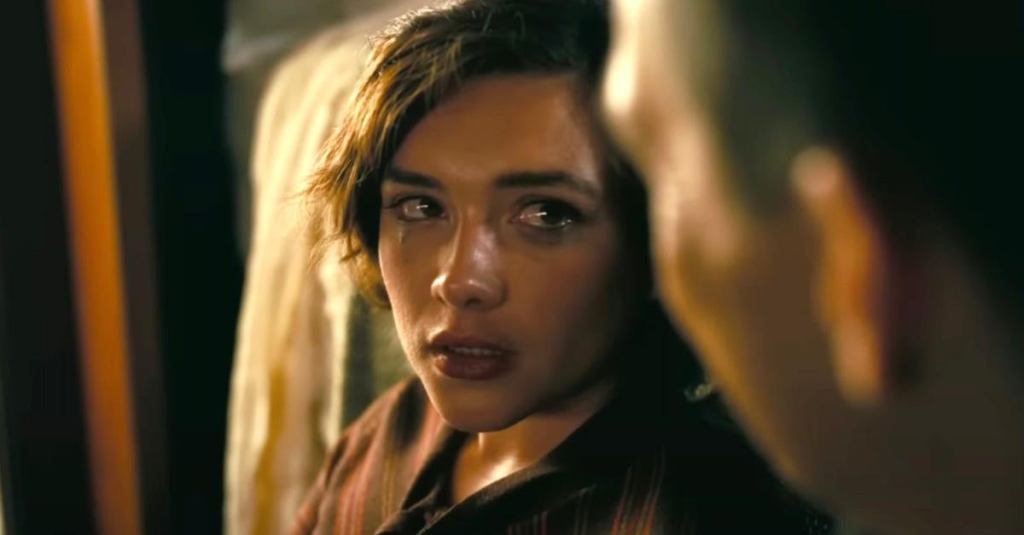Oppenheimer is now out in theaters, and it is certainly one of the more unique biopic experiences. Director Christopher Nolan covers many years of J. Robert Oppenheimer’s (Cillian Murphy) life in a non-linear story that hops between his formative years as a student and theorist; his time pioneering the atomic bomb as leader of the Manhattan Project, and the fallout (all puns intended) that came after as the Nuclear Arms Race began. The film also glimpses into Oppenheimer’s personal life and relationships with two key women in his life: his wife Katherine “Kitty” Oppenheimer (Emily Blunt) and his on-again, off-again lover, Jean Tatlock (Florence Pugh).
Videos by ComicBook.com
WARNING: Mild spoilers below for Oppenheimer
Oppenheimer’s opening act shows J. Oppenheimer meeting Tatlock (a psychiatrist and physician) at a Communist Party of the USA gathering in the 1930s and how they quickly started a tryst. However, the biopic quickly gets murky about what happened between Oppenheimer and Tatlock, detailing scenes of him trying earnestly to court her (and bring her flowers), only to have her thwart his efforts (throwing away the flowers). By the time Oppenheimer meets Kitty at the end of the 1930s, he’s openly admitting that his relationship with Tatlock was never going to manifest into anything greater.
Tatlock (Pugh) comes into the movie several more times, the key scene being her death scene, when she is discovered in her bathroom kneeling on pillows with her head submerged in the tub. Ruled a suicide, her death looks more sinister when Oppenheimer is plagued by horrific visions of gloved hands reaching out to seemingly force Tatlock into the water, causing Oppenheimer to ask Kitty in manic desperation if he’s possibly responsible.
What Really Happened to Jean Tatlock?

The quick-flash imagery that J. Oppenheimer sees of Tatlock’s death seems to be Christopher Nolan’s visual nod to the doubts surrounding Tatlock’s death. Tatlock was known to suffer from clinical depression and had sought out treatment for her condition. It’s also widely believed that confusion about her own sexuality played a part in her mental struggles, as well as her romantic ones.
That all said, there are some historians and figures close to Tatlock (including her brother Hugh) who believe that her “suicide” is suspicious and warranted more scrutiny.
Details for doubt include traces of a barbiturate drug (chloral hydrate) in her system but no alcohol (despite her heavy-drinking habits), which some analysts think would’ve been a natural combination for someone trying to find the resolve for killing herself. Tatlock’s suicide note was left unsigned, sparking theories about how a killer could’ve written out the note, but forging her signature would’ve been too great a risk, so it was left undone. Finally, there was the fact that Oppenheimer was still seen spending nights with Tatlock after marrying Kitty (1941) and starting The Manhattan Project (1943); later revelations about America’s intelligence agencies in the ’40s at least hinted that Tatlock could’ve indeed been assassinated – especially if her Communist associations made forces of the US government concerned about her connection to Oppenheimer and his secrets.
Christopher Nolan doesn’t try to provide any concrete answers about the “truth” of Tatlock’s death – the trauma and doubt it creates in Oppenheimer is more of the point. Then again, Nolan certainly doesn’t discredit the conspiracy theories, either: the filmmaker includes the figure of Col. Borish Pash (Casey Affleck) in one story vignette of Oppenheimer to hammer home just how dogmatically the scientist was monitored during his time at The Manhattan Project – and what dark things could happen to anyone close to him with Communist affiliations, during the do-or-die race to make the first atom bomb. That could’ve, conceivably, included Jean Tatlock.
Oppenheimer is now in theaters.








